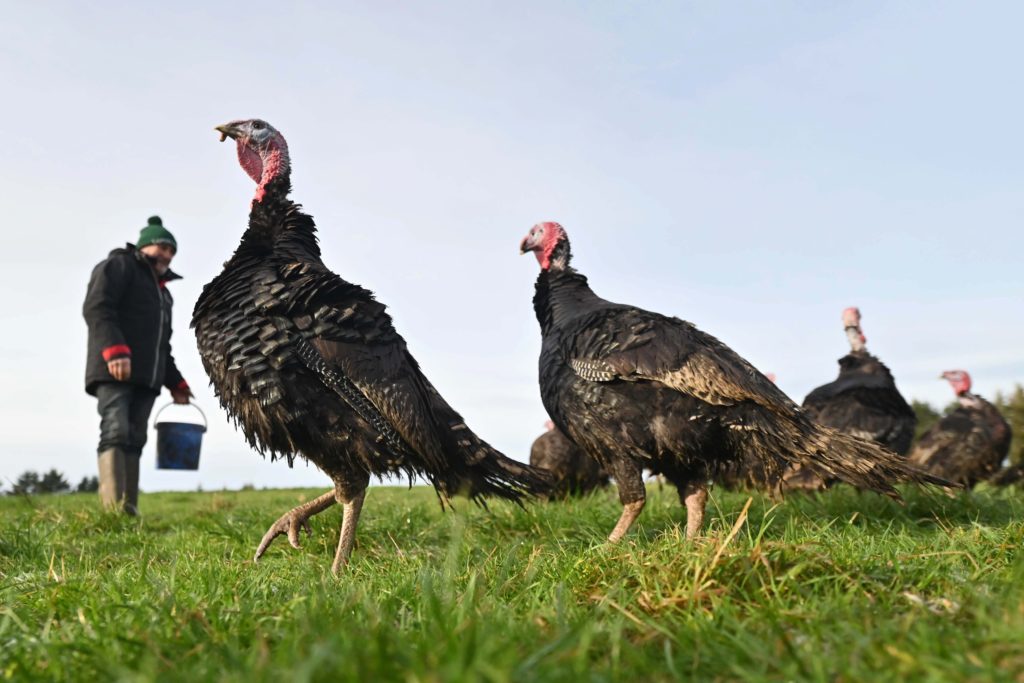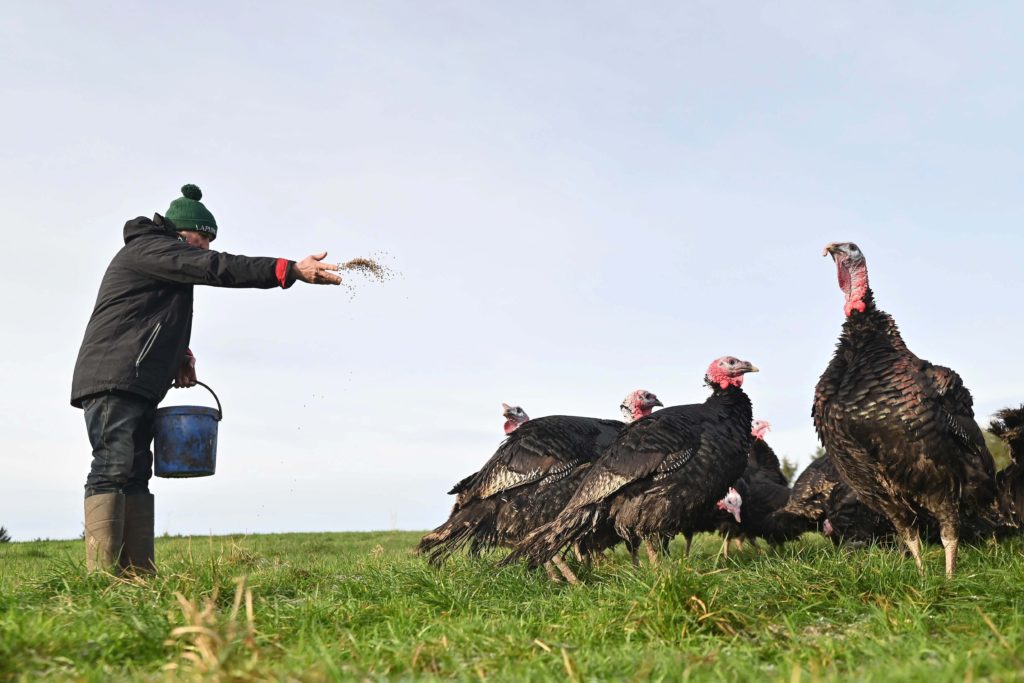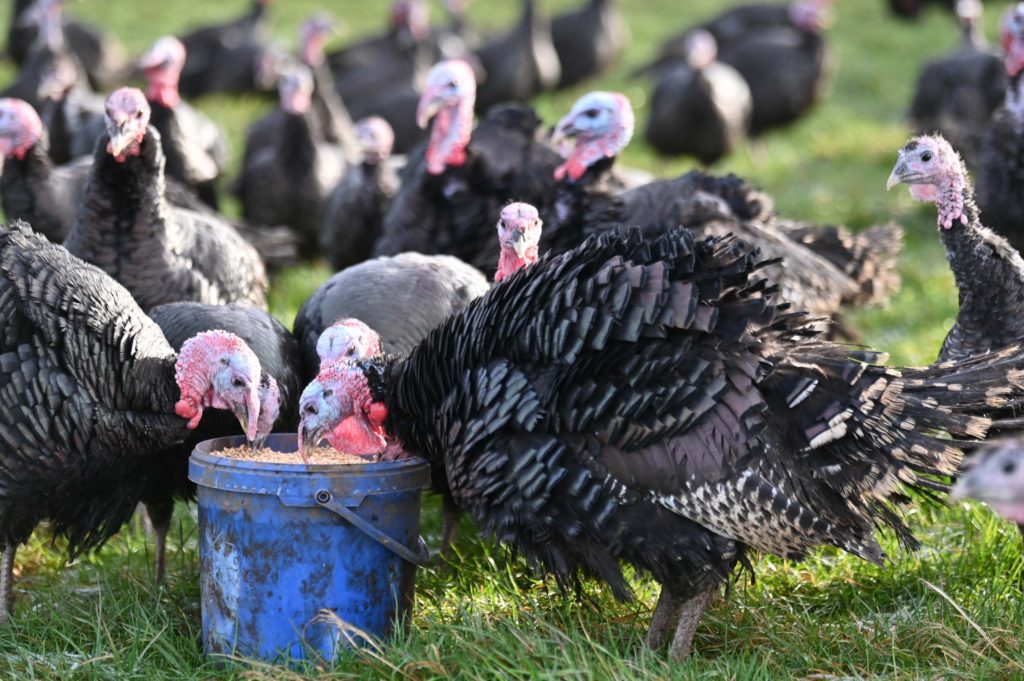At this time of year, millions of turkeys have been flying off the supermarket shelves but in Strathaven at St Brides Poultry, AJ (Anne Jane) and Robert Morris take a natural, ethical and slow grown approach to raising their poultry.
The couple run a small scale poultry operation, with an ethos that is completely opposed to the mass produced meat that you find in stores.
Robert’s family used to own a speciality food company called P & C Morris. His father started the business initially rearing broiler chickens, then diversified into supplying hotels and restaurants with high quality and imported goods.
Unfortunately in the financial crisis of 2008 the company went into administration.
He said, “It was quite a shock, and we thought, what the hell are we going to do?” They had supplied high end French poultry like Bresse and Black leg chicken to top chefs, so the couple plucked up the courage to rear birds themselves.
AJ said, “We had to establish ourselves because it wasn’t just a normal chicken or a free-range chicken. The chefs were really generous with their time, it paid off for them as well and we got everything totally honed.”
At that point their children were young, and a documentary maker made a film about how the financial crash had affected the family.
Looking back at the footage now, AJ said, “It is quite joyful, it was exciting bringing all these wee birds on the farm. It was just idyllic but it was such a strain because it's not like we had a big pool of money or one of us was out working.”
She adds, “It was all hands on deck, robbing Peter to pay Paul. Before we could have any income, the chefs had to try our chicken to see what they were like, so we were living on fresh air for a bit.”
Since then, the couple have continued to face financial challenges as a result of company debts.

Poultry farming is tough at any time of year but more so in winter; changing weather patterns mean they are dealing with wetter, windier conditions.
Although Robert had grown up with poultry, AJ said, “It has been a real learning curve. We don't have any staff, it is just Robert and myself and it is a bit gruelling.
"Our method is to raise happy, healthy, free roaming birds, so we don't follow a scientific formula; we let them grow at their own rate so whoever is finding the most worms and grubs, and who can run the fastest to get to the grain is going to get a bit bigger.”
The birds develop stronger bone structure and it changes the meat texture so that it is firmer with more flavour.
When Robert tasted his home produced chicken for the first time it brought memories flooding back, “it reminded me of chicken that my dad produced, 50 years ago.”
There is no comparison to supermarket meat; “it has more flavour and the texture is denser than normal chicken. If you cook the legs they are really nice and unctuous.”
Robert said, “What we did was slow down the process, our chickens are culled at around 120-140 days.” For average UK commercial poultry this is as low as just 35 days.
St Brides have supplied many top chefs and restaurants including The Gannet, Barley Bree, Moor of Rannoch, The Newport, Mingary Castle, Fhior and the main restaurant at Gleneagles.
The late Andrew Fairlie, was a great supporter of the farm. Robert said, “He was a one off, he was responsible for getting us business from a lot of high end London restaurants.”
At this time of year, the star on the festive dinner table is the traditional turkey, but the Morrises also keep free range capon, duck, geese, and have reared guinea fowl in the past.
They decided to gave them a miss this year, as they are normally bought by restaurants. Robert explained, "They are difficult to rear and we don't want to have guinea fowl that we can't sell.”
His favourite type of bird on the farm are geese, “We have only got 20. We had them when we were kids. They all stay together in one group which is handy if you need to move them anywhere. Ducks can be quite hard to get them to grow. But the most challenging are the guinea fowl, they are flighty and can even fly over the top of the trees, and they are very loud.”

By comparison turkeys are easily stressed, Robert said, “They can be a nightmare and very difficult. It opens them up to catch all sorts of illness.
“You have to make sure the weather is right, and that they are hardy enough before they go outside, and if it's a wet day it's better not to put them out.” It is takes experience to rear them successfully, “we just to try and take away all the stress factors.”
One unusual situation they faced: “There is an airfield in Strathaven a mile from the farm, and they have microlights that used to fly over the turkey field. They thought they were some sort of giant eagle, and scattered and panicked.”
The microlight pilots were asked to stop flying over the field and the turkeys relaxed, “and we have never had any incidents since.”
Robert is actually a turkey fan, he said, “I like them as they are very sociable birds, they will come and see what is happening and they are inquisitive. They flock together more."
Until lockdown about 90 per cent of St Brides custom was with the restaurant trade, and during lockdown they were extremely worried; “we couldn't see where we could sell our products.”
Luckily the smaller retail side of the business, which sold direct to households has increased and Robert said, “We tend to get the same people buying the turkeys from us every year, so we do get a lot of repeat business. The whole time we have been doing this we have never had a problem selling the product - the demand by far exceeds the supply - the challenge has always been to produce the product.”
He is confident that their poultry is far superior to anything else you can buy.
The Christmas meal at St Bride's farm is usually a traditional affair, a home grown slowly produced turkey takes centre stage, although Robert tells us: “we have had years where we have completely sold out of everything."
As AJ trained as a chef she is in charge of cooking. Robert said, “I'm very lucky.” She reveals what’s going to be on the table, “We have the bird filled with chestnut and prune stuffing, roast potatoes, all the normal stuff. Brussels sprouts served with chestnut and bacon, chipolata sausages and glazed parsnip, carrots, bread sauce.”
But the couple don't get a lie in as they still have livestock to feed on Christmas Day.
They also rear piglets which are butchered in time for Christmas to sell as hams and sausages. Robert said, “We have two mumma Mangalitsa pigs, they are just fantastic they are part of the family those two; Dora and Nora. They were quite fierce before they had piglets, I was quite wary of going in beside them but their nature has changed totally.”
The couple have an intense period of work in the run up to the big day, to make sure all the birds are plucked and ready to grace their customers’ tables.

AJ said, “We shut the doors on Christmas Eve at midday and then it is all hands on deck turning the house from a turkey shop back to a home again. I am usually icing the cake at 1 o'clock in the morning.”
All the family arrive on Christmas Eve night at about six o'clock, “and I cook a big fish, usually salmon or halibut in a beurre blanc sauce so it is all nice and easy. In the morning we have a light breakfast and roll into it.”
Despite her best intentions of being organised in advance, “it never happens like that, it, is all a mad rush in the end. We do have a lovely time and we eat really good food all together, which is what we look forward to the most.”
There is an old Christmas tradition where you grab the wishbone from the festive bird and pull it apart. If there is one part bigger than the other you get your wish granted, but if both parts are the same everyone gets to make their wish.
AJ: “I just wish we didn't have any worries. I just like having the family together at Christmas, I have no desire to be anywhere else. I want us all to be together happy and healthy, loving each other.”
Robert: “Just to survive and hope the weather is kind to us, but I think that we we need a different economic system as we have hyper-capitalism which is going to destroy the planet and everything on it, so we need change and we need it to happen quickly.
"My Christmas wish is simple: that customers come flocking to buy their poultry."